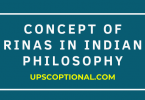Describe the fundamental bases of Gandhism.
OR
“Gandhism was a new phenomenon in Indian politics.” Discuss
Answer – An omnipresent reality : The fundamental base of Gandhism is the conception for an omnipresent spiritual reality which can be called God or simply Truth. Gandhiji had immense and deep faith in God as truth. God he said is a “self-existence, all knowing living force which inheres every other force known to the world. He is both immanent and transcendent. The supreme absolute ever present spirit of God is the starting point of Gandhian Thought.
- Truth is Supreme : Gandhi spoke of truth not only as an ethical category but as the supreme being of the highest quality. It is not only a value or ideal but it is the highest concrete reality. God as truth is the eternally perfect infinite consciousness. In place of physical pleasure Gandhiji stressed realization of God.
He regarded it supreme reality and the supreme good. He said, “I cannot recall a single a single instance when at the eleventh hour God has failed me.” Gandhiji was thus a metaphysical idealist.
- A Metaphysical Realist : But it does not mean that he rejected this world as “illusion or Maya”. The majesty of God is expressed in this world also. He believed in a God who is kind to the prayers of the devotee. He believed that God is within all of us. Though he regarded God as above all attributes but still he claimed that ‘Ram Naam’ was his infallible remedy. He believed in the stories of divine protection to the devotees. He accepted the truth conveyed by the concepts of Karma and Reincarnation. He believed that death after a life is but a prelude to a better and richer life.
- Pure and Disciplined Life : – The spiritual truth, according to Mahatma Gandhi was not to be realized by dialectical skill or abstract thinking but by spiritual experience obtained through pure and disciplined holy life and by practising non-violence in own action. The wickedness of the human heart was the greatest hindrance to the realization of God.
He preached the synthesis of knowledge and devotion. No worthy action for human good is possible without belief in an acceptance of God as truth. For the realization of God, it was essential to realize unity with all the creatures of the world. It is only through faith and purity that the realization of God is possible. It is more faith than reason that can help us in its realization.
- Faith in Human Nature : Gandhiji had a faith in human nature. He believed in the inner goodness of man. The human being has a sense of spiritual self consciousness and morality. Every man has the possibility of spiritual growth.
The individual conceived in moral and spiritual terms is the supreme consideration of Gandhian political thought. Gandhi wanted to bring about a psychological regeneration of man. He believed that there was some thing inherently divine in man’s nature. But the existing man is also imperfect. He is far from God. Hence the present man should be raised to his higher ideal self.
He was optimistic and was never despaired of man’s emancipation. He advocated a moral change of human heart. He even believed that the heart of the enemy can also be won over. He always appealed to the element of divinity in man. He felt that a disciplined individual can do a lot in reforming the institutions of which he was a member.
He always laid stress on the moral and spiritual side rather than on the intellectual and scientific side of man’s nature. As such he laid emphasis on the performance of one’s own duties without meddling with the duties of other’s.
That is what the concept of “SVADHARMA AND SWADESHI” teach.
Thus he constantly laid stress on the necessity for the moral and spiritual uplift of man. He was opposed to all those thinkers who believed that human beings can be reformed by objective forces. According to him social betterment depends upon individual efforts for self-purification.
Thus the revelation of moral powers of the individual is an important point in the political thought of Gandhiji. That is why that spiritual realization and social service are integrally connected in Gandhian thought. There is no antithesis between social service and self-development.
To quote Gandhiji “Man is higher than the brute and has divine mission to fulfil. To find truth completely is to realize oneself and one’s destiny.”
- Psychological Regeneration : Gandhiji did not think that society as such in any way corrupts the individual. He traces the evil in man to his own evil tendencies. This evil is not social but psychological. He did not think that human nature is sinful. Man can be cured of his evil tendencies by prolonged efforts. Gandhiji believed in innate goodness of man and stressed the realization of human perfection. Hence he laid emphasis on Non-violence and other virtues. Man can reform himself by performing good actions. Gandhiji was an optimist who had faith in the psychological regeneration of man. He was firm in his belief that the superior wisdom of God will ultimately triumph.
- Religious Supremacy : Gandhiji considered the religious of human nature as prior to social and political transformation. The theory of spiritualization of politics demands the fundamental remaking of human nature. Human nature is not something static and immutable but is dynamic and amenable to changes. Gandhiji wrote ‘ My belief in the capacity of non-violence rejects the theory of permanent in clasticify of human nature.”
“As compared to the primitive tribes there has been improvement in human nature. Gandhiji accepted that man can change his temperament and can control it by a process of prolonged purification ( Tapasya ). It is possible to remake human nature.
- Nobility and Decency : If there has to be a change in human nature it is to be thought about over by institutional mechanics but by energization of moral feeling. Gandhiji thus had a supreme faith in the nobility and decency of human nature.
- A moral humanist : Gandhiji was a moral and spiritual humanist. Service to mankind was his mission. He did not want to use force or coercion for making people good. Moral goodness is acquired by a process of introspective scrutiny and cultivation of character. Force can hardly make the individual moral. Gandhiji emphasized the purification of the conscience of the individual.






